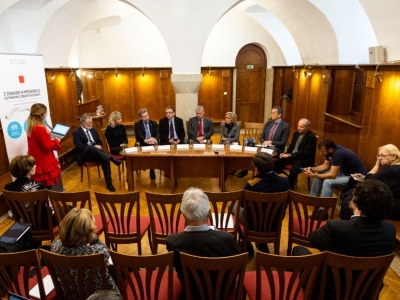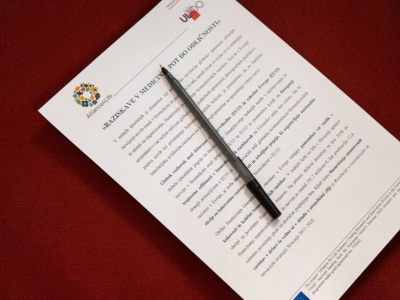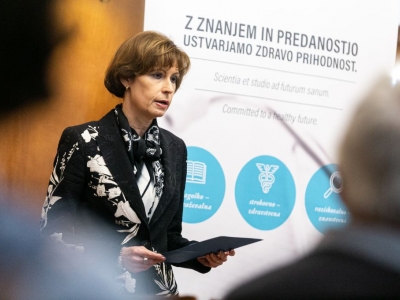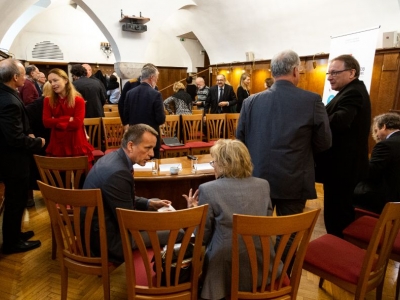
National Round Table in Slovenia: The Future of Biomedical Research
On 6th November 2019, the Faculty of Medicine of the University of Ljubljana organized a round table focused on the current state and future directions of biomedical research in Slovenia. During this unique event, representatives from several major Slovenian research institutions exchanged their views on the strategies for boosting excellence in the field of biomedical research in Slovenia.
Prof. Dr. Ksenja Geršak, Vice Dean for Research of the Faculty of Medicine, initiated the debate by introducing Alliance4Life and its goals, and made an excellent starting point for the discussion, which covered key elements that are conducive to research excellence – infrastructure, internationalization, evaluation systems, funding, and a stimulating work environment.
Guests were then addressed by Acad. Prof. Dr. Robert Zorec, Vice President of the Slovenian Academy of Sciences and Arts, who highlighted the need to support research excellence, including creating a supportive research environment, with more flexible administrative and remuneration rules. He added that the public is inclined to encourage and celebrate top achievements in sports, but fails to acknowledge top achievements in science and research, and this should be changed.
Prof. Dr. Igor Papič, Rector of the University of Ljubljana, emphasized that we must stimulate brain circulation, while avoiding brain drain, in order to create an excellent research milieu. Participants agreed that Slovenia has excellent researchers, but should provide more appealing working conditions, including administrative and remuneration rules for researchers to stay or return home, and influence future advancement in their fields. Additionally, out-of-date research infrastructures should be replaced via special funding schemes that would enable the acquisition of new state-of-the art large equipment.
Prof. Dr. Igor Švab, Dean of the Faculty of Medicine, pointed out that the national strategy and directions should be focused on opening doors to renowned domestic and foreign researchers who have the knowledge and resources to raise research excellence to a higher level. The latter could be pursued by a newly established joint fund, financed by several respective ministries and national organisations. Prof. Dr. Tamara Lah Turnšek, former Director of National Institute of Biology, emphasized that this joint fund could be responsible for large interdisciplinary multi institutional projects, resulting in great success stories with a positive impact on society and policymakers.
Mag. Peter Volasko, State Secretary from the Ministry of Education, Science and Sport, confirmed that the new national strategy will work towards a simplified administrative and bureaucratic burden, and should foster interdisciplinary cooperation within Slovenia and with other members of the European Union. Dr. Saša Jenko, Head of the Sector of Public Health Research, Directorate-General for Research and Innovation (DG RTD), European Commission, highlighted that these goals, which will play a major role in the future direction of research strategies in Slovenia, and cannot be achieved on a single-player basis, but should be facilitated through cooperation between research institutions.
University Medical Centre Ljubljana, the largest hospital in Slovenia, has already taken structural steps in this direction. However, as stated by Prof. Dr. Aleš Blinc, Head of the Department of Vascular Medicine, more appealing motivational schemes for clinical researchers are necessary in order to overcome local organizational peculiarities. Finally, Prof. Dr. Gregor Anderluh, Director of the National Institute of Chemistry, emphasised that a special focus should be placed on early stage researchers, as they will be the driving force for future research developments.
Participants shared various solutions for current issues and agreed on the most important directions of science development in Slovenia in the future, confirming it also in a joint statement. The need for further cooperation of this kind was expressed, and the Faculty of Medicine already confirmed that round tables regarding the advancement of research fields in Slovenia will continue in spring 2020.
 The project "Alliance for Life Sciences: Closing Research and Innovation Divide in the European Union" received funding from the European Union's Horizon 2020 research and innovation programme under grant agreement No. 779303.
The project "Alliance for Life Sciences: Closing Research and Innovation Divide in the European Union" received funding from the European Union's Horizon 2020 research and innovation programme under grant agreement No. 779303.





